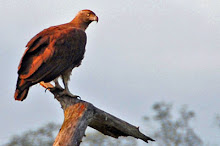Kentish Plover- Disappeared from Kent.. and Britain!
 |
| Ringed Plover. @Dungeness Nature Reserve, Kent. |
I was hoping to see a related species here, the Kentish Plover, but it was not around at the place which seemed like its kind of habitat, and came to know it has DISAPPEARED from Britain! - It no longer breeds in these islands. I had first seen Kentish Plover back in Kerala!.(2005), while volunteering for a bird survey of Kole Wetands, in Thrissur near Guruvayur.
[ Dungeness, on the English Channel, 25km from the Channel Tunnel area, has a special geographic feature.. Ness= Headland or 'Cuspate Foreland' jutting out from shore.. It is found on coastlines and lakeshores that are created primarily by longshore drift. This area on the southcoast of England was also an island in Roman Maps!.. It got connected to the mainland around 1000years ago due to alluvial deposits..]
http://www.rspb.org.uk/wil
http://en.wikipedia.org/wi
Ironically, after this birding trip now, came to know that the 'Kentish' Plover is no longer seen in Kent or anywhere in Britain!. Though it "breeds in a wide range, from southern Europe to Japan and in Ecuador, Peru, Chile, the southern USA and the Caribbean", it's no longer seen in Britain!..
But, it was heartening to read the recent news from Kerala, that the Project to protect the Kole Wetlands is taking shape
(It has 30,000 acres of wetlands including farmlands and paddyfields).
The data we were collecting during the bird survey
was used to provide supporting arguments as to why the area needed more protection for its wildlife and habitats,
and to help plan the Project.
Related news this year from Kerala:
http://www.hindu.com/2011/
Agriculture Minister in Kerala is handed over the project — Biodiversity Conservation Plan for Kole Wetlands High Value Biodiversity Area-- to the Forest Dept, which will submit it to the central govt .
Project was prepared after consultations with farmers, people's representatives, scientists and officials.
It proposes to pay an incentive of Rs.1,000 per acre to kole farmers every year as a recognition for protecting the kole lands for over the years.
[ Dungeness, on the English Channel, 25km from the Channel Tunnel area, has a special geographic feature.. Ness= Headland or 'Cuspate Foreland' jutting out from shore.. It is found on coastlines and lakeshores that are created primarily by longshore drift. This area on the southcoast of England was also an island in Roman Maps!.. It got connected to the mainland around 1000years ago due to alluvial deposits..]
http://www.rspb.org.uk/wil
http://en.wikipedia.org/wi
Ironically, after this birding trip now, came to know that the 'Kentish' Plover is no longer seen in Kent or anywhere in Britain!. Though it "breeds in a wide range, from southern Europe to Japan and in Ecuador, Peru, Chile, the southern USA and the Caribbean", it's no longer seen in Britain!..
But, it was heartening to read the recent news from Kerala, that the Project to protect the Kole Wetlands is taking shape
(It has 30,000 acres of wetlands including farmlands and paddyfields).
The data we were collecting during the bird survey
was used to provide supporting arguments as to why the area needed more protection for its wildlife and habitats,
and to help plan the Project.
Related news this year from Kerala:
http://www.hindu.com/2011/
Agriculture Minister in Kerala is handed over the project — Biodiversity Conservation Plan for Kole Wetlands High Value Biodiversity Area-- to the Forest Dept, which will submit it to the central govt .
Project was prepared after consultations with farmers, people's representatives, scientists and officials.
It proposes to pay an incentive of Rs.1,000 per acre to kole farmers every year as a recognition for protecting the kole lands for over the years.


0 Comments:
Post a Comment
<< Home